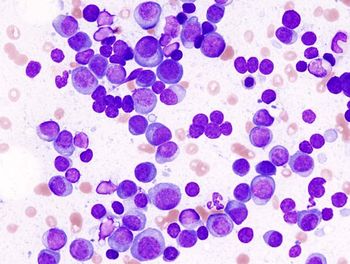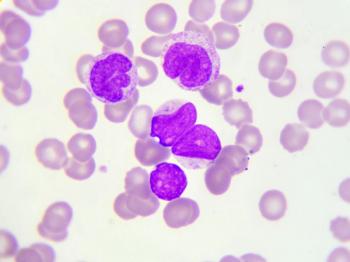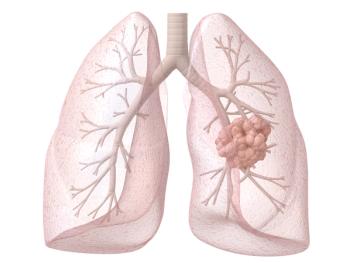
Patients with pretreated KRAS p.G12C–mutated NSCLC experienced a continued durable clinical benefit with sotorasib.

Your AI-Trained Oncology Knowledge Connection!


Patients with pretreated KRAS p.G12C–mutated NSCLC experienced a continued durable clinical benefit with sotorasib.

When performed with a reduced-intensity conditioning regimen of bortezomib, fludarabine, and melphalan, alloHCT was safe in patients with high-risk multiple myeloma.

For heavily pretreated patients with EGFR-mutated NSCLC resistant to EGFR TKIs, patritumab deruxtecan induced clinically meaningful and durable efficacy.

Heavily pretreated patients with relapsed/refractory B-ALL who received a single infusion of KTE-X19 experienced robust and durable responses.

Patients with advanced synovial sarcoma who received treatment with catequentinib experienced improved disease control and progression-free survival compared with dacarbazine.

Successful treatment of patients with Philadelphia chromosome–positive acute lymphocytic leukemia was noted with ponatinib plus blinatumomab, denoted by complete and major molecular responses.

Some patients who progressed on osimertinib had a response to therapy with amivantamab and lazertinib, and these were seen regardless of known resistance mechanisms to EGFR inhibitors.

Results of the phase 2 SPEARHEAD-1 trial were presented at the 2021 ASCO Annual Meeting, with a high overall response rate reported with afamitresgene autoleucel in advanced synovial sarcoma or myxoid/round cell liposarcoma.

CancerNetwork® sat down with Shannon N. Westin, MD, MPH, at the 2021 ASCO Annual Meeting to talk about the use of adavosertib in PARP inhibitor–resistant ovarian cancer.

Patients with non-small cell lung cancer receiving alectinib did not have better results than patients receiving crizotinib.

The phase 1 dose-finding CTNO1552101 trial of TN0155 in adults with advanced solid tumors reported initial results at the 2021 ASCO Annual Meeting.

CancerNetwork® sat down with Paul M. Barr, MD, at the 2021 ASCO Annual Meeting to talk about data from RESONATE-2 showing sustained progression-free and overall survival in patients with chronic lymphocytic leukemia being treated with ibrutinib in the frontline setting.

A phase 1 trial of the investigational agent CLN-081 indicates antitumor activity coupled with a tolerable safety profile as treatment of patients with non–small cell lung cancer and EGFR exon 20 insertion mutations.

Two-year efficacy and safety data from a pivotal trial of nivolumab/ipilimumab plus chemotherapy as treatment of non–small cell lung cancer support the continued use of the combination.

Regardless of primary tumor site or disease stage, avelumab maintenance was able to elicit overall survival benefit versus best supportive care for platinum-treated urothelial cancer.

Data presented at the 2021 ASCO Annual Meeting from the phase 3 PACIFIC trial show long-term survival benefit for patients with unresectable stage III non–small cell lung cancer treated with durvalumab following chemoradiotherapy.

Follow-up data from the phase 3 TIVO-3 trial that were reported at the 2021 ASCO Annual Meeting serve to further support the use of tivozanib versus standard-of-care sorafenib in patients with metastatic renal cell carcinoma who have failed on prior therapy.

High rates of durable complete responses are reported at the 2021 ASCO Annual Meeting with ciltacabtagene autoleucel in patients with relapsed or refractory multiple myeloma.

Phase 1/2 data presented at the 2021 ASCO Annual Meeting for the novel PSMA-targeting agent HPN424 show tumor responses in patients with pretreated metastatic castration-resistant prostate cancer.

A positive efficacy and safety profile persists with pralsentinib in RET fusion–positive non–small cell lung cancer, according to data presented at the 2021 ASCO Annual Meeting.

The CAR T-cell product idecabtagene vicleucel in patients with heavily pretreated multiple myeloma continued to show benefit of therapy at a median follow-up of 24.8 months.

Data presented at the 2021 ASCO Annual Meeting on 3 prominent trials of niraparib as maintenance for ovarian cancer after a positive response to platinum-based chemotherapy further support the use of the agent in multiple settings.

Phase 2 data presented at the 2021 ASCO Annual Meeting indicate that more than half of patients with previously treated advanced colorectal cancer who were treated with pembrolizumab plus lenvatinib were alive at 6 months.

Data from the KEYNOTE-564 trial presented at ASCO indicate benefit of pembrolizumab therapy in patients with clear cell renal cell carcinoma who were receiving therapy in the adjuvant setting.

Awaited outcomes of the phase 3 OUTBACK trial presented at the 2021 ASCO Annual Meeting do not indicate benefit of adjuvant chemotherapy for patients with cervical cancer.

CancerNetwork® sat down with Stephen V. Liu, MD, at the 2021 American Society of Clinical Oncology Annual Meeting to talk about pralsetinib for patients with non–small cell lung cancer harboring RET fusions and adequate biomarker testing in the frontline.

Results of the phase 3 JUPITER-02 trial presented at ASCO 2021 support the use of toripalimab plus chemotherapy for recurrent or metastatic nasopharyngeal carcinoma.

Survival outcomes improved when nivolumab was added to either ipilimumab or chemotherapy versus chemotherapy alone in advanced/metastatic esophageal squamous cell carcinoma

Data from the OlympiA trial support olaparib use in certain patients with BRCA1/2–positive early breast cancer.

A 40% reduction in the risk of death was observed when 177Lu-PSMA-617A was added to standard of care therapy in patients with PSMA-positive metastatic castration-resistant prostate cancer.